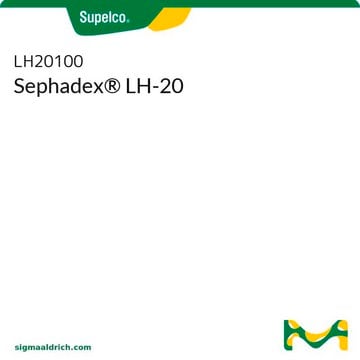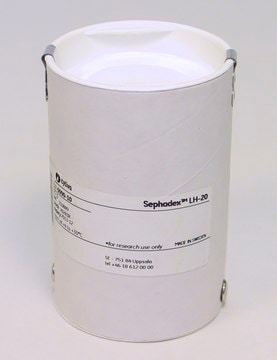Recommended Products
type
Type IX
Quality Level
form
beads
technique(s)
liquid chromatography (LC): suitable
storage temp.
2-8°C
Looking for similar products? Visit Product Comparison Guide
Application
Hydroxyalkoxypropyl-Dextran is used for liquid chromatography, protein chromatography, and gel filtration chromatography. Hydroxyalkoxypropyl-Dextran has been used to develop a nondestructive method for effective removal of lipids from small quantities of aqueous protein as well as to develop a highly specific method for the determination of cortisol in human serum and urine.
Lipophilic, hydrophobic gel for liquid chromatography.
Other Notes
Hydroxypropyl beaded dextran (Lipophilic Sephadex, LH-20-100), substituted with long chain alkyl ethers.
Substituted approx. 50% by weight with alkyl chains of length C15-C18
Storage Class Code
11 - Combustible Solids
WGK
WGK 3
Flash Point(F)
Not applicable
Flash Point(C)
Not applicable
Personal Protective Equipment
dust mask type N95 (US), Eyeshields, Gloves
Certificates of Analysis (COA)
Search for Certificates of Analysis (COA) by entering the products Lot/Batch Number. Lot and Batch Numbers can be found on a product’s label following the words ‘Lot’ or ‘Batch’.
Already Own This Product?
Find documentation for the products that you have recently purchased in the Document Library.
J B Lowe et al.
The Journal of biological chemistry, 262(12), 5931-5937 (1987-04-25)
Rat intestinal fatty acid-binding protein (I-FABP) is an abundant, 15,124-Da polypeptide found in the cytosol of small intestinal epithelial cells (enterocytes). It is homologous to rat liver fatty acid-binding protein (L-FABP), a 14,273-Da cytosolic protein which is found in enterocytes
U Kragh-Hansen
Analytical biochemistry, 210(2), 318-327 (1993-05-01)
A simple and nondestructive method was developed for effective removal of lipids, such as long-chain fatty acids and steroids, from small quantities (2-10 mg) of aqueous protein. The procedure operates with a high recovery of protein (97%) and was elaborated
D Apter et al.
Clinica chimica acta; international journal of clinical chemistry, 63(2), 139-148 (1975-09-01)
A highly specific method for the determination of cortisol in human serum and urine is described. The sample is first extracted with diethyl ether/ethyl acetate (1 : 1, by vol.), then chromatographed on a highly lipophilic derivative of Sephadex (hydroxyalkoxypropyl
Our team of scientists has experience in all areas of research including Life Science, Material Science, Chemical Synthesis, Chromatography, Analytical and many others.
Contact Technical Service








